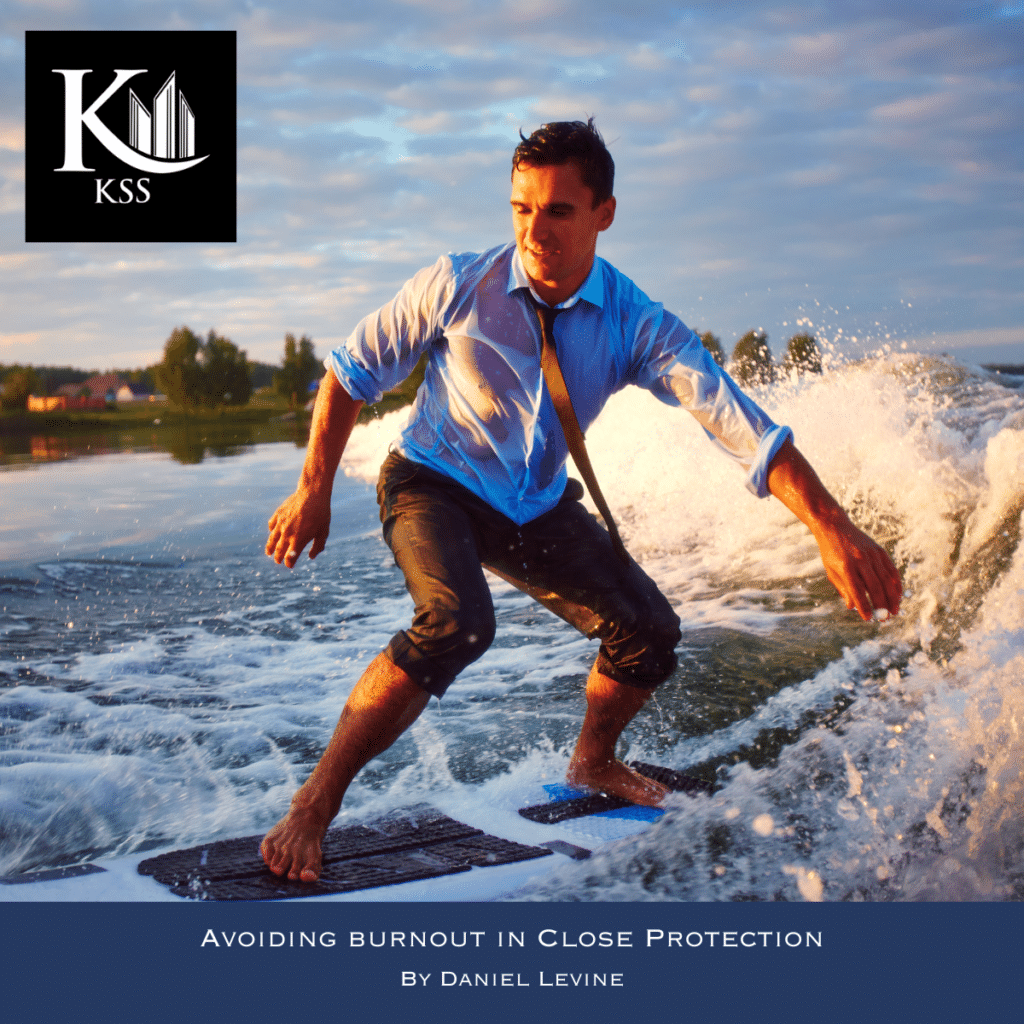Operating within a demanding environment, close protection professionals face constant pressure to ensure the safety of individuals in potentially hazardous situations. This article delves into the concept of burnout, exploring the unique factors contributing to its prevalence in the security field. Additionally, it outlines some proactive strategies aimed at preventing burnout in close protection. In this piece we look at some strategies proven to reduce stress, promote wellbeing and prevent burnout. After all how can we protect others if we are not operating optimally ourselves? Clearly operational demands will dictate a lot of how we spend our work hours, which makes it even more important to prioritize well-being and self-care in any time you do have to yourself.
What is burnout?
Burnout is a state of emotional, mental, and physical exhaustion resulting from chronic stress that has not been effectively managed or resolved. In close protection, the specific stressors include the need for constant alertness, unpredictability exposure to high-risk situations, long working hours, and the responsibility of safeguarding the lives of others. Understanding why burnout occurs in the security field is crucial for developing effective prevention strategies.
Planning and Scheduling
Effective planning and scheduling form the bedrock of the close protection profession. The unpredictability of the job necessitates meticulous planning to cover all aspects of security and most eventualities. A well-structured work schedule helps anticipate challenges, allocate resources efficiently, and reduce the stress associated with last-minute changes. By creating to a well-thought-out plan, close protection professionals can establish a sense of control over their responsibilities. Taking the time to schedule self-care into your day is a good strategy; good times are as soon as you get up or just before bed. Once tactic which has been proven to help your mind know when it is time to switch off at night, is to keep a notepad beside your bed. Just before you retire for the night write down the major tasks for the next day. In doing this, you are telling your subconscious that the day is over, and your mind may relax.
Exercise
We all know how good exercise is for us but it’s easy to let exercise slide, life gets in the way. Not only is being physically fit and capable a prerequisite in the protection world. Regular exercise is an essential element in preventing burnout. The physical demands of close protection, coupled with the need for mental sharpness, make maintaining physical fitness imperative. Engaging in regular exercise not only enhances physical well-being but also releases endorphins, the body’s natural stress relievers, contributing to improved mental well-being. Incorporating exercise into the routine is crucial for sustaining the stamina required in this demanding profession. Access to gyms can be limited, however many options for hotel rooms exist and can help maintain your baseline level of fitness while deployed.
Meditation
Meditation serves as a hugely valuable tool for managing stress and preventing burnout. Close protection operatives can benefit from incorporating mindfulness practices into their daily routines. Meditation provides a mental break, fosters focus, and cultivates resilience. Whether it involves a few minutes of focused breathing or guided meditation, integrating mindfulness practices can profoundly impact emotional balance. It can take time to get used to meditation but the key is to start with two to three minutes at a time and maintain the practice regularly. Practicing meditation regularly even when you’re not feeling stressed builds resilience, and the ability to deal with stress better all round when you are experiencing it. Apps such as Headspace are really good for introducing us to the practice of mindfulness; which if practiced regularly can make a huge difference to wellbeing.
Breathwork
Conscious breathwork is a practical technique that can be discreetly employed in the close protection profession even whilst you are on task. Techniques such as controlled breathing or box breathing can be particularly effective in moments of heightened tension or stress. Implementing breathwork helps regulate the body’s stress response, aiding in maintaining composure and preventing the accumulation of chronic stress that leads to burnout.
Yoga
The holistic benefits of yoga have been known for centuries and make it an excellent practice for close protection professionals. Yoga not only enhances physical strength and flexibility but also promotes mental clarity and emotional balance. Integrating yoga into our routine provides a dedicated time for self-care, contributing to overall well-being and resilience against the stressors of the profession. If you don’t fancy joining a class, there are hundreds of free classes on youtube or other sharing platforms.
Learning to Say No
Close protection professionals often grapple with the challenge of taking on additional responsibilities beyond their primary roles. Learning to say no when necessary is crucial for preventing burnout. Setting boundaries and communicating limitations are essential aspects of self-preservation in a profession that can be all-consuming. Recognizing personal limits is a proactive step towards maintaining a healthy work-life balance.
Screen Time Management
The reliance on technology in close protection can lead to excessive screen time. Managing digital engagement is vital for preventing burnout. Close protection professionals should incorporate strategies such as taking breaks, setting specific limits, and scheduling technology-free periods. Balancing screen time with moments of disconnection is essential for mental well-being. Clearly during the working day you cannot always have breaks from your device. Implement breaks where you can if you can. Certainly In your own time, do try and minimise screen time especially just before going to bed. If feeling particularly stressed consider deleting social media apps from your phone. Even doing this temporarily can help with stress as the constant bombardment of information adverts has an impact on our wellbeing.
Stoicism
Stoicism is an ancient philosophy which has seen a recent revival; espoused by modern philosophers such as Ryan Holliday as well as historical figures including Marcus Aurelius, Seneca and Epictetus. With its focus on maintaining inner calm in the face of external challenges, stoicism aligns well with the demands of close protection. Adopting a stoic mindset involves accepting the inherent uncertainties of the profession, focusing on what can be controlled, and developing resilience. Stoicism provides a philosophical foundation for navigating the high-stress environment with composure. The timeless principles of this ancient philosophy really can be applied to modern life, especially in the security field and if practised regularly will help with well-being and stress reduction.
Diet
Nutrition plays a significant role in sustaining the physical and mental stamina required in close protection. A well-balanced diet that includes a variety of nutrients supports overall health and energy levels. Close protection professionals should prioritize regular, nutritious meals when feasibly possible to ensure they have the fuel needed to perform optimally and withstand the demands of the job.
Conclusion
Preventing burnout in close protection is not only crucial for immediate well-being but is also essential for sustaining a long and fulfilling career. The strategies discussed – planning and scheduling, exercise, meditation, breathwork, yoga, saying no, screen time management, stoicism, maintaining a healthy diet, and moderating alcohol intake – should not be viewed as reactive measures employed only when stress is evident. Instead, they should be considered proactive, ongoing practices with a cumulative effect on overall well-being.
By consistently incorporating these strategies into their daily lives, close protection professionals can build resilience, enhance stress management capabilities, and foster a sustainable approach to their demanding roles. Recognizing the importance of self-care as an integral part of the profession is not a sign of weakness but a strategic investment in a long and successful career in close protection. The cumulative impact of these practices contributes to a robust foundation for navigating the challenges of the security field while preserving the mental, emotional, and physical health of those dedicated to ensuring the safety of others.

